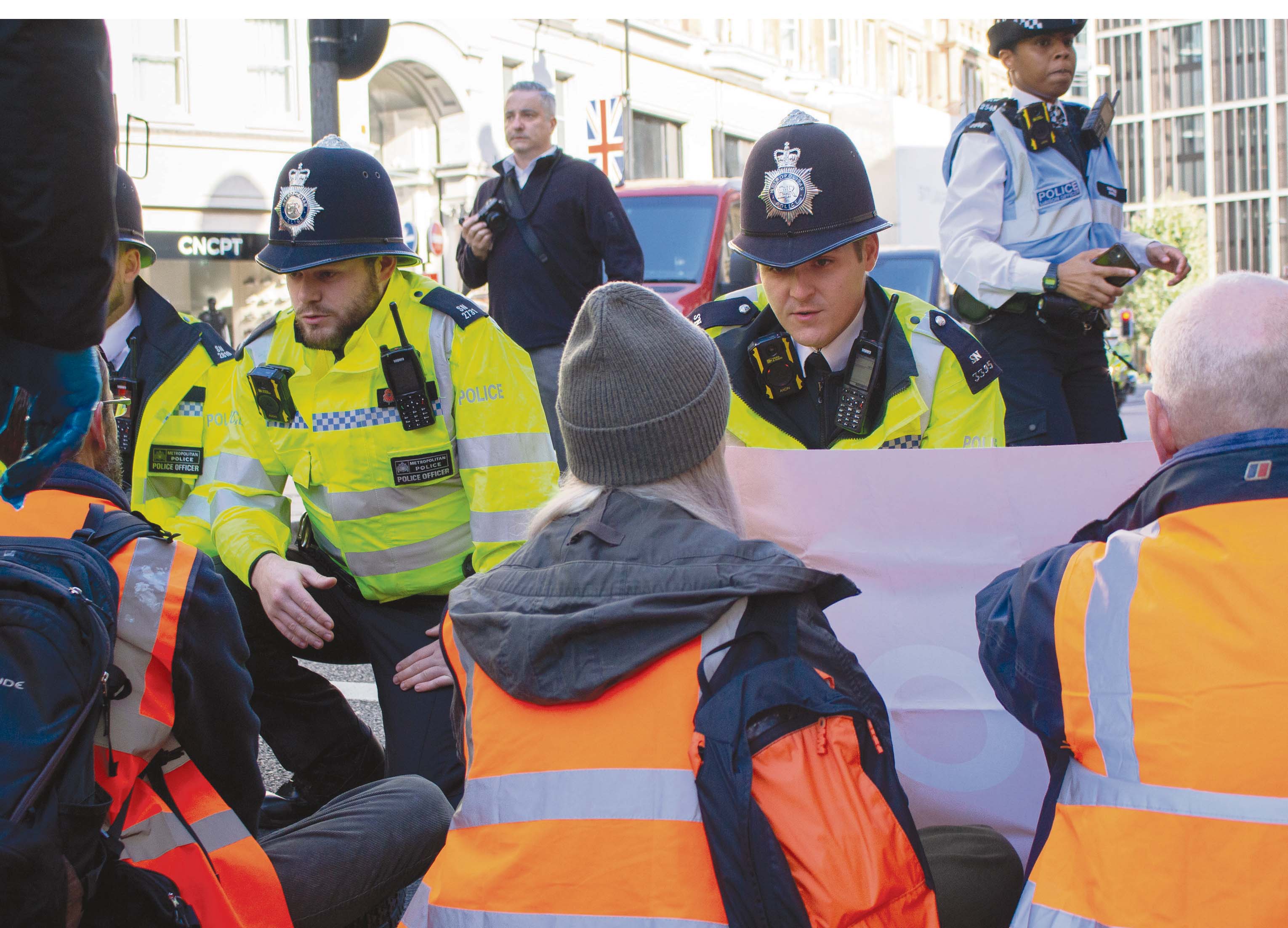Turning point or wasted opportunity?
FORUM: Anna Lamche hears how 2022 could well be seen by the history students of the future as a ‘turning point’ year after heading out west for debates and discussions at the Hay Festival’s Winter Weekend
Thursday, 8th December 2022 — By Anna Lamche

Just Stop Oil protesters in central London in October [Izzy Rowley]
AS we approach its end, it becomes clearer that this year was one of transition, a year of long-anticipated boundaries passed: the death of the Queen, the Ukraine war, the end of cheap energy, the fall of Boris Johnson, UK temperatures surpassing 40 degrees Celsius for the first time since records began.
When mid-century children study Modern British History: 2000-Present, you might expect 2022 to feature as a “turning point”, a cornerstone in making sense of what comes after.
Despite this, for much of the year a sense of directionlessness has coloured our national discourse, as we careen from one disaster to the next, bogged down in culture wars, often with no clear vision for the future, or even tools to make sense of the present moment, or the recent past.
So where do we go from here? It’s an important question, and one that formed the basis of a panel discussion chaired recently by investigative journalist Oliver Bullough at Hay Festival’s Winter Weekend.
Joined by journalist and food campaigner Rosie Boycott, columnist and anti-poverty activist Sali Hughes, and writer and environmentalist Anita Roy, the answer from Mr Bullough’s panel was a rousing reaffirmation of the power of local politics, local action and local people to achieve change.
In the words of Ms Hughes: “People give me more hope than politicians.”
Global leaders, the panel agreed, are by and large failing to address the existential challenges of our time.
There followed a downbeat reflection on the COP27 climate negotiations in Egypt last month, which according to Ms Boycott saw world leaders “bypass” the pledge to hold global temperatures to 1.5 degrees above pre-industrial levels, moving on “to a loose agreement about loss and damage.”
“I think what we saw at COP was also a rather sad acceptance that we’re looking at the gaps in the world, and mitigating,” Ms Boycott said. “Emissions are not going down, there is no real good global policing.”
Ms Roy said making sense of climate change at a “global” level often leaves humans “feeling overwhelmed, disempowered, tearful… the natural human response is to say: ‘we’re completely f**ked, and we have done terrible, terrible damage to our beautiful planet… and we deserve to die.’”
According to Ms Roy, hope – “that sense of agency, connection” – is rooted in local action.
“Over the past year, certainly we’ve seen a lot of disenchantment with big government, with big state, with the nation-state, with big corporations, with banking, all of the kind of big institutions that people used to look to solve things, like food, like energy, we’re just saying: we need to do this ourselves because we’ve run out of time.”
She called for the “de facto devolution of power in the way that our democracy is deployed.”
Ms Boycott, who sits as a crossbench peer, said there was a strong case for reform of the House of Lords, criticising the second chamber for its acceptance of peers who have “bought their way in.”
The House of Lords, Ms Boycott said, is currently packed with “lobby fodder” – those who are made lords by “Tory grandees” because they have the stamina to stay for the midnight votes that aging Labour peers lack.
“A lot of the big votes – like the Law and Order Bill at the moment – are going to go at midnight,” she said.
Speaking ahead of Labour’s Report of the Commission on the UK’s Future launch on Monday, Ms Boycott said she was in favour of “Gordon Brown types of amendments” that would “stop a lot of the rot that comes through from recent prime ministers.”
As Labour leader Sir Keir Starmer pledged to “consult” on constitutional reform this week, there was for the first time in a long time the glimmer of a sense of direction, beyond the familiar formulas (“Growth, Growth, Growth”) in Labour’s safe policy code – often regarded as anodyne by critics.
But constitutional reform has been promised in the past and never materialised. If Labour is serious about offering an alternative to Rishi Sunak’s government, it must recognise the moment of transition in which we find ourselves and capitalise on it.
It must not just consult on change but see it through, and go further: as people lose faith in our country’s institutions, we need to see not just the decentralisation of power, but also an end to our first-past-the-post voting system in favour of something more participatory and, ultimately, democratic.
These are vital changes if we are to begin tackling the defining challenges of our age, from climate change to inequality.
We find ourselves at a juncture, a turning point: when mid-century children look back, will they see our time as one of radical reform, or a moment of opportunity unforgivably wasted?
• Anna Lamche is assistant editor of the New Journal